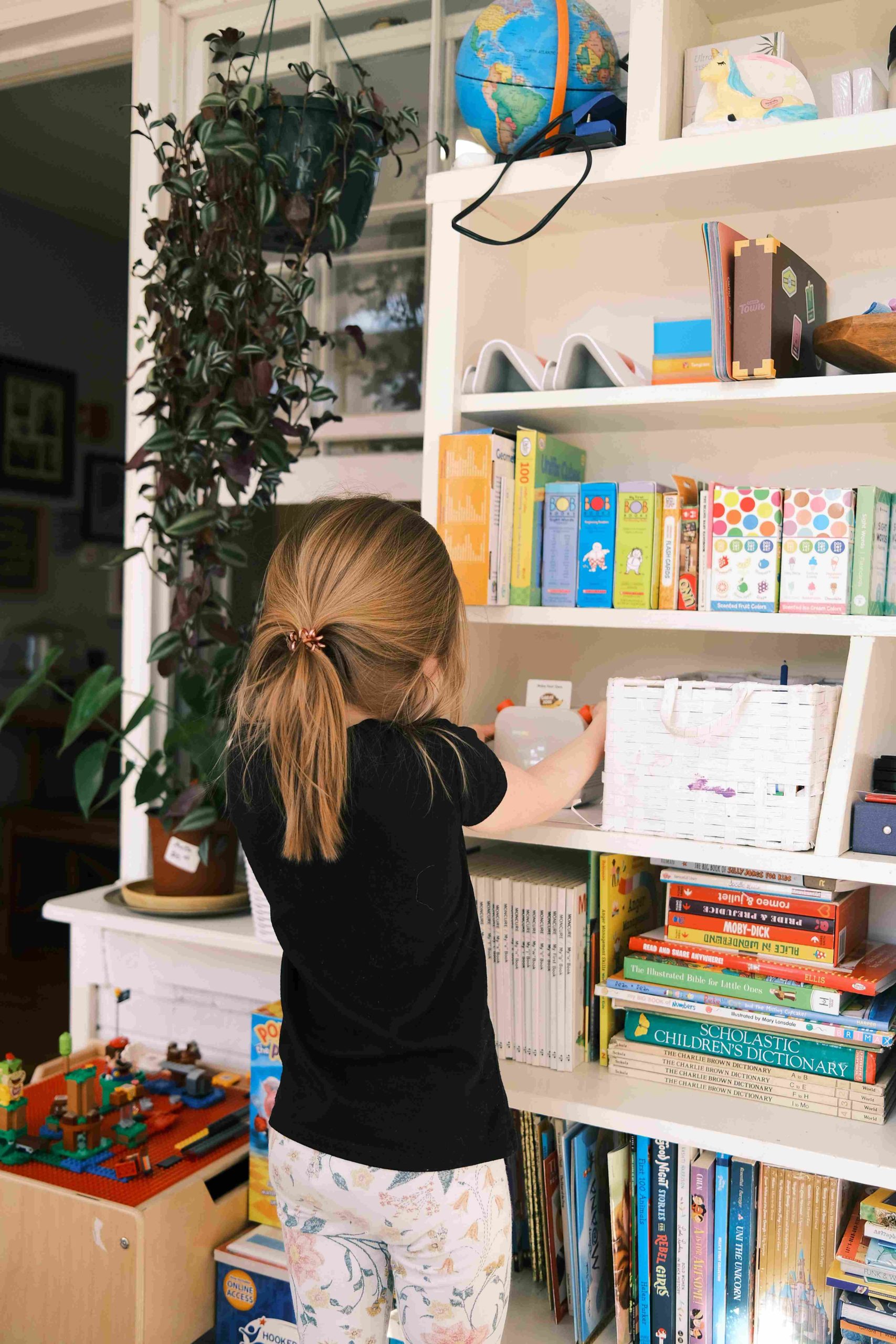For the 2022-2023 academic year, our at home preschool curriculum will incorporate two more programs. For the 21-22 school year, we continued our work with Logic of English (LoE) and Math with Confidence (MwC). In our son’s daycare, the teachers used Handwriting without Tears (HWT) throughout the year, so we spent time at home practicing fine motor skills to complement the writing practice they were doing.
What makes an at home preschool curriculum desirable?
When looking for an at home preschool curriculum, remember that because children can’t read yet, a lot of the implementation will fall on parents. While it’s understandable to want to find a child led instead of a parent driven program, the tradeoff is that more screen time will be involved. There’s no shame in this of course – think about how much your child learns when they watch educational programming like The Octonauts. But if you’re following the Montessori ethos, then you know that children learn best when they can engage their head, hands, and heart.
I look for the following traits when evaluating at home preschool curriculum:
- Secular – facts are facts, and science is science. No revisionist history or creationism!
- Diversity in literature – a program will win my heart once I see its recommended book list.
- Easy to set up activities – while it’s fine to have a complicated project every now and again, anything that requires more than 10 minutes of prep time routinely is a no no for me. I need to be able to read, understand, and start an activity in 10 minutes. I hate when my kid loses interest because it took me too long to figure something out!
- Hands-on activities – no reliance on worksheets! Ideally I’m not doing more than 3 pages on any given day.
- Skills-based: helps children gain pre-reading, pre-writing, and number sense skills
- Fun – for both of us; not just the child
- Easy to modify and no guilt about skipping – the mix of activities needs to actually resonate with what my child is interested in and not be so tightly built upon each other that I can’t skip activities without impacting future progression in the curriculum
What levels should I pick for an at home preschool curriculum?
In teaching and education forums, other experienced teachers have commented that kindergarten and first grade curricula are very similar. This overview of what children learn grade by grade was useful. For those in New York, the New York Next Generation Learning Standards are a useful reference. Note that they are broken out by subject and sound technical.
Kindergarten is the great equalizer because it’s where many kids in the US enter the formal schooling system for the first time. Some will have had exposure to early academics from private programs beforehand, but others will not have had this exposure or know how to manage themselves in a school setting. As a result, it doesn’t matter if your kid is ahead in Kindergarten – all kids will work through the beginning foundational steps of each subject. This is why in my view, the academic material in first grade and Kindergarten are pretty similar.
In NYC, pre-K (UPK) is increasingly the first year for many of the city’s 4-year olds. Whatever you thought of Mayor de Blasio, he did get UPK right by expanding it. Of course there is still inequality and disparity across the city’s UPK programs – we unfortunately still live in a society where your address determines the quality of your school. But if the alternative is complete screen time, then the UPK seats are not bad in comparison.
When it comes to picking an at home preschool curriculum, you don’t have to stick with whatever is labeled for preschool. There is a lot of fluidity between the pre-k, Kindergarten, and first grade programs. Depending on what skills your child is already exhibiting, you could start with any of these levels and modify the content for your child’s age. We’ve used first grade math with confidence since our son was 3.5 years old. We’re not going to finish it this year, but the activities and skills are just the right amount of challenge for him. Also, math games have surprisingly been waaaaay more effective for Mr. 4. I really shouldn’t be surprised, but just putting it out there that even with the games, he has surprised me by showing that he can in fact play games for 5 or 6 year olds even as a three year old. Ages truly are only a guideline – never let them hold you back from introducing a resource early if your child is ready.
The Big Reveal: Adding Torchlight and Scientific Connections through Inquiry
Our choice to supplement daycare at home means that the at home preschool curriculum we choose needs to be implementable in an hour or less on weekdays. We’ll start level C of Foundations for Logic of English this summer, continue on with first grade Math with Confidence, and layer in the geography/literature portions of Torchlight (Kindergarten level) as well as the activities from Scientific Connections through Inquiry (SCI; level zero). We’ve been doing a soft launch since we returned from vacation and it has been fun!
I’m really excited about the book selections and accompanying activities in Torchlight. These are modern, diverse books and the focus on exposing kids to the world outside of America is admirable. We can’t always be jetsetting (and inflation alone makes the thought of taking extra trips daunting), but armchair traveling is definitely in reach and a useful substitute. I failed to realize that many of the boutique accommodations I want to stay at have age restrictions in place! So our options with a four year old are much more limited than say at 8, 10, or 12 years of age. I’d rather wait and be able to enjoy trips when Mr. 4 can more easily be incorporated into our type of travel.
Scientific Connections through Inquiry stood out to me because of its focus on making connections and involving the whole body. It is aligned with the Montessori philosophy in the sense of having the child help themself learn a concept. I like that there are tie-in videos and books already picked out so I don’t have to search for extensions. The themes are also tied in to daily life which I find very helpful.
Overkill? Maybe, but not completely
This sounds crazy when you see that each of these programs run 100-200 pages of text. But the trick is that you don’t have to do everything your at home preschool curriculum prescribes. You’ll also quickly determine what types of recurring activities in the curricula are actually interesting for your child.
It also sounds crazy when you think about the fact that in theory, Mr. 4 will be exposed to the topics, skills, and themes at some point during his time in school. But the issue that I have never been able to 100% eliminate is the fact that I just have no idea who his teacher will be, whether Mr. 4 will form a bond with that person, and whether Mr. 4 will learn. I also want to have a baseline of what Mr. 4 knows and is capable of in the event that I have to lobby for him in any way.
Finally, I do not do everything every day. I typically start the week off with LoE or MWC then give Mr. 4 a choice between book time (Torchlight) or SCI. This means four days of “new” content and the rest of the days are repeating activities he likes or free play. When we have weekends and days off from school, we can charge ahead if we feel like it, but equally, there is no pressure to do so because this is all enrichment and driven by what Mr. 4 feels like doing.

